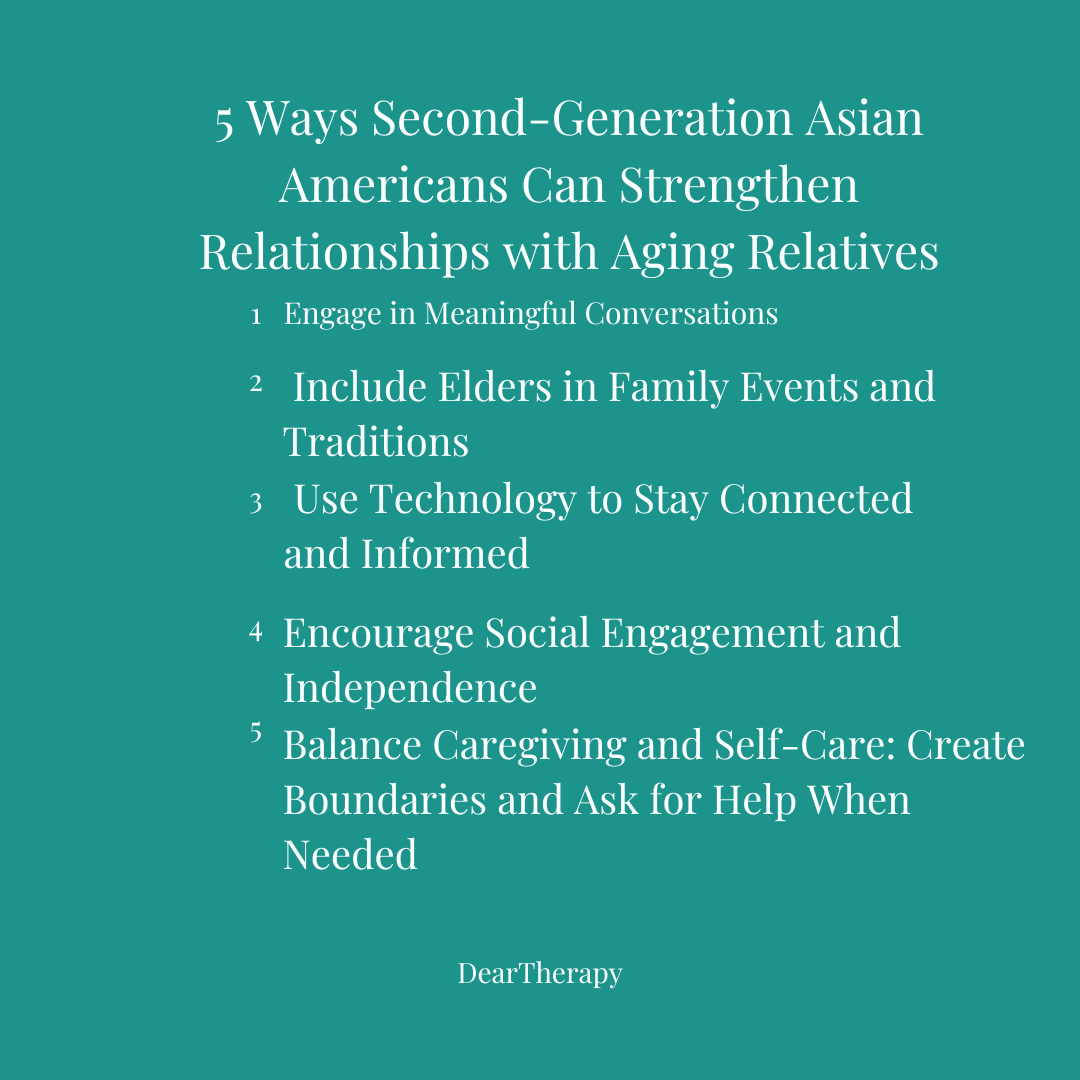5 Ways Second-Generation Asian Americans Can Strengthen Relationships with Aging Relatives
As a second generation Asian American, balancing the Western way of life with elderly relatives can be difficult. Your aging family members have a different set of cultural values and needs than what you are accustomed to. Staying connected with them can feel challenging and sometimes overwhelming, especially if they’re accustomed to traditional AAPI practices and expectations.
Here are 5 strategies to support and connect with elderly relatives in a way that honors both your heritage and modern realities.
Engage in Meaningful Conversations
Older generations in Asian cultures have a lot of wisdom and life experiences to share. Take the time to create some prompts to ask your elders about their life experiences and stories. Be prepared for conversations like these to be one-sided or to need a stopwatch—they can be chatterboxes and talk for long periods of time! Remember that it’s a meaningful way to connect, and the stories they may want to share may intrigue you.
Is there anything you’ve ever wanted to know? Now is the time to ask.
Example Prompts:
What is your favorite childhood memory?
What was life like when you were my age?
What traditions or values were important to you growing up?
Include Elders in Family Events and Traditions
Our elders will want to be involved in our lives, even as they change and modernize. Bring or invite your elderly relatives to family gatherings, new and modern traditions, birthdays, or family dinners. The invite can allow that connection, and attempting to adapt family events to suit everyone can show care and connection.
Ways to Do It:
Invite them to celebrate holidays or special events like birthdays or even simple family dinners
Incorporate modern activities they enjoy, whether that’s a TV show, walks, or photography
Use Technology to Stay Connected and Informed
As life becomes busier, it can be challenging to spend as much time with our the elders in our lives. Using technology can bridge that gap, whether geographical or physical. It can help to make communication with them more regular. Teaching them how to use video calling apps like Zoom, WhatsApp, or WeChat will help them stay connected and informed with family life and also life outside of their sphere.
How to Do It:
Show them how to use technology for video calling such as Zoom, WhatsApp, or WeChat for consistent check-ins and face-to-face interactions.
Use family group chats to keep them updated on family events, news, or even simple moments from your day.
Encourage Social Engagement and Independence
Engaging with other people outside of the family can help your elderly relatives to feel more connected to their community. Encouraging social interaction can help them maintain a sense of independence and dignity.
Ways to do it:
Assist them with finding local senior centers or community programs where they can interact with peers.
Encourage them to get involved in activities that are aligned with their interests such as cultural clubs, Tai Chi classes, or religious events such as enAGED.
Balance Caregiving and Self-Care: Create Boundaries and Ask for Help When Needed
As a second-generation caregiver, it’s essential to take care of yourself while supporting your elderly relatives. Without setting boundaries, you could burn out.
Schedule regular self-care for yourself—whether that means setting personal boundaries or creating a relaxing ritual.
Share caregiving duties with family members or consider professional help if needed.
Prioritize activities that help you recharge, like spending time with friends, pursuing hobbies, or simply relaxing.
Know when to step back—When caregiving and managing your own life feels too overwhelming, it’s okay to step back.
Nurturing Cross-Generational Connections in a Second-Generation Household
Supporting and connecting with elderly relatives as a second-generation Asian American involves navigating cultural values, family dynamics, and your own personal boundaries. These 5 strategies provide practical ways to foster deeper bonds, help them remain socially engaged, and honor your cultural heritage without neglecting your own well-being. By striking a balance between these needs, you can create stronger and more meaningful relationships across generations.
Dear Therapy® Invitation
We invite you to reflect on these five strategies to strengthen relationships with your AAPI Aging relatives and to comment how you think these strategies will help your family.


